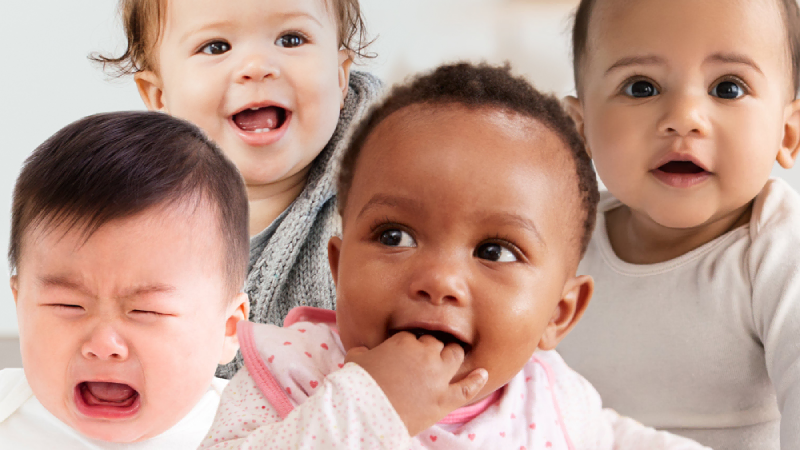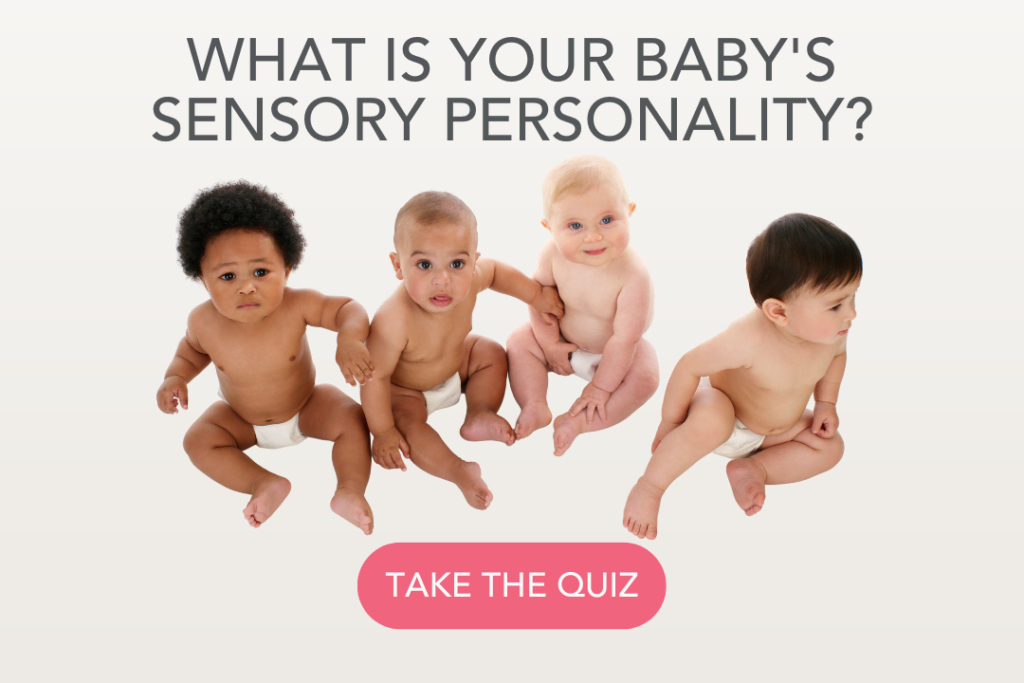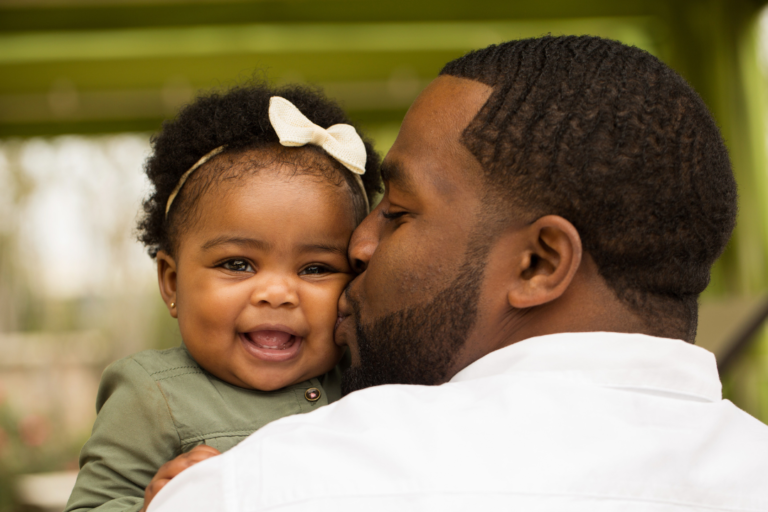Understanding the 4 different baby personalities is what I refer to as the secret to successful parenting. As an OT and mother of 3, I have first-hand experience of what it is to have children from the same parents who have completely different personalities and therefore, needs. Why does it matter? Because while becoming a parent is an incredibly rewarding experience, it can also be overwhelming and challenging, especially for first-time parents. One of the biggest challenges new parents face is understanding their baby’s unique way of communicating their wants and needs. This not knowing can leave parents feeling confused and frustrated.
It’s not uncommon for parents to rate our ability to parent based on our baby’s ‘behaviour.’ We judge our success by our baby’s sleep and feeding patterns. It’s easy to think we are failing if we evaluate our baby’s routine without considering our baby’s sensory personality. Let’s explore the four different baby personalities to give you a guide to understanding your baby’s individuality. With this knowledge, you can meet your baby’s needs and build a stronger, more fulfilling bond.
What are the 4 baby personalities?
The 4 baby personalities refer to four distinct personality types that babies can exhibit from an early age. These personality types are determined by our baby’s sensory threshold. Your baby experiences and learns about the world through their senses. Whether a baby is a sensory seeker or has a low threshold for sensory input will affect their sleep, feeding, development, and mood or temperament. babies.
The 4 baby personalities are:
- The Social Butterfly
- The Slow-to-warm up baby
- The Settled baby
- The Sensitive baby
These 4 baby personalities are divided into two main sensory types: a high sensory threshold – the social butterfly and settled baby fall into this category. Babies with low sensory thresholds are typically slow-to-warm up and sensitive babies. Find out more on an episode dedicated to sensory personalities on my podcast.
What is the difference between baby temperament and baby personalities?
The terms ‘temperament’ and ‘personality’ are often used interchangeably when discussing babies, but they actually refer to slightly different aspects of a child’s behaviour and development. A baby’s temperament is their natural inclination towards certain behaviours and reactions, such as how easily they are soothed or how quickly they become overstimulated. Temperament or sensory threshold is largely innate and determined by genetics. This tends to remain relatively stable throughout a child’s life. On the other hand, a baby’s personality encompasses their temperament or sensory personality as well as their learned behaviours and responses to their environment. Personality can be shaped by experiences and interactions and is more likely to change over time. Understanding both your baby’s temperament and personality can help you better respond to their needs and provide the best possible care for them.
When do babies start to develop their personalities?
Babies start developing their personalities from the moment they are born. Their personalities continue to develop and evolve throughout their childhood (and beyond). In the early months, babies express their sensory personalities through their responses to different stimuli such as sound, touch, and movement. Depending on your baby’s sensory personality, they could be naturally easy going or more sensitive to change, for example.
It may be tricky to determine a very new baby’s sensory personality but in time, and certainly by the time your child reaches toddlerhood, their sensory personality will be apparent. Is your baby outgoing and loves to engage with strangers? Or is your baby more reserved and feels safer when they are close to you? We’ve mentioned that genetics play a vital role in your child’s sensory personality, but that their experiences and interactions with their environment also have a significant impact. As a parent, understanding your child’s unique personality can help you better support their development and nurture their strengths.
What are the 4 baby personality types?
Understanding the 4 different baby personalities starts by knowing what the four sensory personalities are: the social butterfly, the settled baby, the slow-to-warm-up baby, and the sensitive baby. Below is more information about how these different personalities present themselves.
The Social butterfly
The social butterfly loves interacting with others and the world. They are typically more alert and as they become more mobile, they seem to constantly be on the move. Curious and social, these babies don’t like to be left alone for long. These babies also love to be carried around and you may find that you never have your hands free. A social butterfly has limitless energy and is a bundle of fun but they’re also very busy and can be impulsive. Life with a social butterfly is never dull but can be exhausting. They don’t easily go to sleep for fear of missing out. They can demand your attention and seek out sensory experiences as much as possible.
The Settled baby
The settled baby is much more laid back than other baby personalities. They’re usually easy going, and flexible – in other words, they can eat and sleep with ease regardless of the surroundings. By a few weeks old, the settled baby will be starting to fit into a routine; and they may well be sleeping through the night by 4 months old. A settled baby copes well with stimulation and interaction and is generally content to go with the flow. They’re so relaxed in fact, that they may reach developmental milestones slightly later than other babies. This is generally nothing to be concerned about, as the settled baby is usually happy to watch the world go by as opposed to learning to crawl and walk to explore their environment independently. Embrace your settled baby and relish in their calm, predictability!
The Slow-to-warm-up baby
Some babies just take longer to adjust to anything new. They may be happy and lively until they’re in a familiar space. When they’re in a different environment however, they can take a while to get accustomed to unfamiliar sensory information and appear to be shy. The slow-to-warm-up baby has a lower sensory threshold then the social butterfly or settled baby and this can sometimes be known as ‘Velcro babies’ because they are happiest when near mum or dad. A slow-to-warm-up baby loves routine and is easily upset by changes in their schedule. As older children, slow-to-warm-up babies are quiet and a little anxious when out of their comfort zone. They tend to withdraw rather than embrace novel and unpredictable situations. Once they are comfortable though, they warm up and can be the life of the party.
The Sensitive baby
Sensitive babies are highly reactive to sensory stimuli, making them easily overwhelmed. They may struggle to settle and experience colic for an extended period. Parenting a sensitive baby can be challenging, as they express their sensory overload through fussiness and crying. Breastfeeding may be difficult initially due to their sensitivity to touch, smell, and taste. It is best to feed them in a quiet, dimly lit room when they are calm after a nap. Unlike settled babies, sensitive babies take longer to self-soothe and may resist being swaddled or using pacifiers. However, persisting with swaddling and sucking techniques can greatly simplify your life. These babies are highly attuned to their surroundings and will offer a unique and refreshing perspective on the world once they start talking.
The key to understanding the 4 different baby personalities is knowing that every baby is precious, and each personality brings its own set of challenges and rewards. The important thing is to embrace your little person and help them to engage happily with the world. This journey is much easier if you understand their sensory personality. This was what I shared with Elimination Communication advocate, and founder of Go Diaper Free, Andrea Ohlson in a podcast.
What personality type does my baby have?
As mentioned, every child is unique and develops at their own pace. But there are some personality traits (described above) that babies tend to exhibit, which can help you identify your baby’s personality. You can do this by careful observation and by taking my free Sensory Baby Personality Quiz. It’s a quick way to determine your baby’s sensory threshold and it includes some great tips to help you develop a better understanding of how best to care for and support your baby’s development. Take the quiz now!
Can a baby personality change as they get older?
Yes, a baby’s personality can change as they get older. While temperament/ sensory threshold is relatively constant throughout life, their overall personality is shaped as they grow and mature. Sometimes, a settled baby can present more as a social butterfly as they get older and experience new interactions with the environment. Similarly, a sensitive baby will probably remain thoughtful and sensitive but can still become a confident, outspoken little being. What’s important is to recognise that personalities are not set in stone and can continue to develop throughout a person’s life.
Nurturing your baby’s personality
Nurturing your baby’s personality is crucial for their development, fostering confidence, resilience, and happiness. Creating a safe and loving environment is key, where your baby feels supported, encouraged, and free to explore. Offer ample positive reinforcement, affection, and supervised opportunities for them to engage with their surroundings. Recognize and celebrate their individuality, supporting their unique interests and strengths. Introduce diverse experiences and activities to help them develop skills and abilities. Through nurturing their personality, you lay the foundation for a strong self-identity and a positive mindset, paving the way for a joyful and satisfying future.
6 Tips for Parenting Your Baby Based on Their Personality Type
Here are some tips for parenting your baby based on their personality type:
- For babies that thrive on routine and consistency, stick to a regular schedule for feeding, napping, and playtime to help them feel secure and comfortable. Download the Parent Sense app to design a routine specifically for your baby with gentle prompts and reminders to keep you on track.
- Sensitive babies may require more patience and understanding. Recognize their challenging behaviour as a natural part of their personality, and provide plenty of positive reinforcement and reassurance.
- Slow-to-warm-up babies may need more time to adjust to new situations. Provide a safe and familiar environment and give them plenty of time to adapt on their own terms.
- Settled babies may benefit from a balance of structure and flexibility. A predictable routine should include time to explore and experiment new experiences and activities.
- Regardless of your baby’s personality type, it’s important to remain calm, patient, and supportive in your interactions with them. Try to avoid being critical or overly controlling. Instead, focus on building a strong, positive relationship based on trust and mutual respect.
- Always be mindful of your baby’s unique needs and preferences. Pay attention to their cues and respond accordingly. Whether that means offering comfort and reassurance, providing stimulating activities, or simply giving them space to explore.
For more tips and a deeper understanding about how to support your baby’s unique personality, watch my webinar now:
Lastly, you also have a sensory personality. It’s worth knowing your response to stimulation to help you adjust your parenting to meet your baby’s needs. Listen for more about Parent Sensory Personalities and what I call ‘goodness of fit’ on an episode of Sense by Meg Faure.





